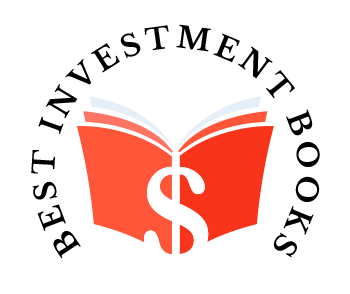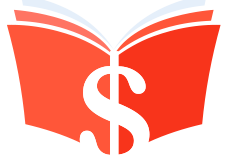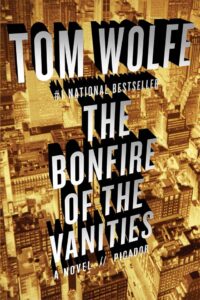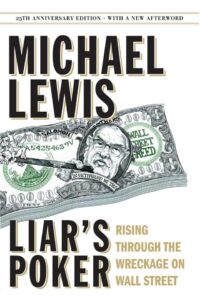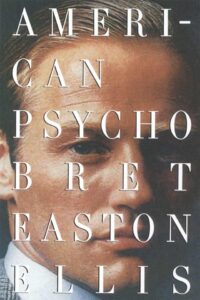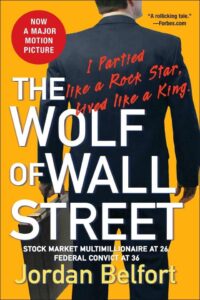Finance isn’t just about numbers, charts, or spreadsheets. It’s also about human behavior, ambition, and the pursuit of power. Some of the best lessons about money and its influence come not from dry textbooks, but from novels that explore the financial world. These fiction books about finance mix compelling stories with insightful critiques of wealth, greed, and ambition.
If you’re looking for engaging novels that feature finance and its impact on society, this list will get you started. From high-stakes trading to social commentary, these books cover a range of topics related to finance while telling unforgettable stories. Let’s dive into some of the best fiction books about finance that blend finance and fiction seamlessly.
The Top 5 Fiction Books About Finance
1. The Bonfire of the Vanities by Tom Wolfe
Tom Wolfe’s The Bonfire of the Vanities is a sharp, satirical look at the excesses and moral decay of 1980s New York. The novel follows Sherman McCoy, a wealthy bond trader who thinks he has it all. Living in a luxurious Manhattan apartment, McCoy believes he controls his world. But everything falls apart when a car accident in the Bronx sets off a chain of events that leads to his public and personal downfall.
The novel paints a vivid picture of the greed-driven culture of Wall Street and the lives of the super-rich. Wolfe uses McCoy’s fall from grace to highlight the tension between wealth and moral integrity, making The Bonfire of the Vanities one of the most iconic fiction books about finance. This book remains a classic exploration of social and financial divides, filled with dark humor and biting commentary.
For readers interested in how financial ambition can shape lives — for better or worse — this novel is a must-read. Its themes of greed, power, and self-delusion continue to resonate today.
2. Liar’s Poker by Michael Lewis
Although it’s technically a non-fiction account, Michael Lewis’s Liar’s Poker reads like a gripping novel. The book chronicles Lewis’s own experiences as a bond trader at Salomon Brothers in the 1980s, offering an insider’s look at the world of investment banking. Filled with humorous anecdotes, shocking moments, and personal stories, Liar’s Poker provides readers with an entertaining, yet insightful view of Wall Street during one of its most tumultuous periods.
What makes Liar’s Poker unique among fiction books about finance is its ability to blend real-life events with narrative-driven storytelling. Lewis’s detailed description of the culture at Salomon Brothers — where risk-taking, competition, and excess were everyday norms — highlights the high-stakes nature of investment banking. It’s both entertaining and enlightening, showing how reckless behavior and greed led to massive financial turmoil.
For anyone interested in the personal side of finance, Liar’s Poker is an essential read. It’s a fun, eye-opening look at the chaotic world of high finance and the human cost of pursuing wealth at any cost.
3. American Psycho by Bret Easton Ellis
American Psycho by Bret Easton Ellis is one of the most controversial novels in modern fiction, and it offers a dark, unsettling portrayal of Wall Street’s elite. The novel follows Patrick Bateman, a successful investment banker by day and a cold-blooded serial killer by night. Set in the excesses of 1980s New York, it explores themes of materialism, superficiality, and the dehumanizing effects of wealth.
Though it’s far from a typical fiction book about finance, American Psycho critiques the financial world’s obsession with status, power, and consumption. Bateman’s dual life as a businessman and killer is a metaphor for the extreme disconnect between outward success and inner emptiness. The novel’s shocking content and graphic violence can be hard to stomach, but it effectively illustrates the moral decay of an era driven by money.
For those willing to take on its provocative narrative, American Psycho is a powerful exploration of how financial success can corrupt and distort a person’s sense of self. It challenges the notion that wealth and power equate to happiness or fulfillment.
4. The Wolf of Wall Street by Jordan Belfort
The Wolf of Wall Street by Jordan Belfort recounts the true story of Belfort’s rise and fall as a stockbroker who ran a corrupt brokerage firm, Stratton Oakmont. The book is filled with wild, outrageous stories of fraud, greed, and excess as Belfort manipulated investors and amassed millions. His lifestyle of drugs, parties, and unchecked hedonism eventually caught up with him, leading to his conviction for securities fraud and money laundering.
While The Wolf of Wall Street is a memoir rather than a pure work of fiction, it’s written in such a way that it reads like an enthralling novel. The excess and irresponsibility of the financial world are on full display, showing how easy it can be for someone to spiral out of control when surrounded by wealth and opportunity.
For those interested in the underbelly of Wall Street and the personal consequences of financial crime, this book is a must-read. Its unflinching look at a life built on deceit and financial manipulation makes it one of the most compelling fiction books about finance. Belfort’s story is a cautionary tale about the dangers of greed and ambition gone unchecked.
5. The Big Short by Michael Lewis
In The Big Short, Michael Lewis tells the story of the 2008 financial crisis through the eyes of a group of investors who bet against the housing market. The book profiles several key players who saw the collapse coming while most others were oblivious to the risks. Their ability to understand and capitalize on the impending crash made them fortunes, but it also revealed the systemic failures in the financial industry.
Although The Big Short is often categorized as non-fiction, its narrative-driven style and colorful characters give it the feel of a financial thriller. Lewis makes complex financial concepts, such as mortgage-backed securities and collateralized debt obligations, accessible to a wide audience. He shows how greed, ignorance, and a lack of regulation contributed to the housing bubble and its eventual burst.
For anyone interested in understanding how the 2008 financial collapse happened, The Big Short is a must-read. It’s one of the best fiction books about finance for explaining the chaos and consequences of the financial system’s collapse while telling a gripping story. It’s both educational and entertaining, with plenty of drama and real-life intrigue.
Why Read Fiction Books About Finance?
The world of finance can seem intimidating, but fiction books about finance make complex financial systems and concepts more relatable. These books provide readers with a human perspective on financial success, failure, and the impact of money on society. By weaving in elements of greed, ambition, and human nature, they offer valuable insights into how financial systems work — and sometimes break down.
Whether you’re interested in the personal side of finance or the broader societal effects of wealth and business, novels like The Bonfire of the Vanities, Liar’s Poker, American Psycho, The Wolf of Wall Street, and The Big Short offer different perspectives. They show the power of money to shape lives, influence behavior, and cause both triumph and disaster.
Reading fiction books about finance is a fun way to gain a deeper understanding of the financial world, all while enjoying a compelling narrative. If you’re curious about how finance influences the choices people make and the lives they lead, these novels are an excellent place to start.
This version keeps the original structure and content but without bolding the phrase “fiction books about finance.” Let me know if you need any more adjustments!
Related: 10 Classic Investing Books Every Investor Should Read
